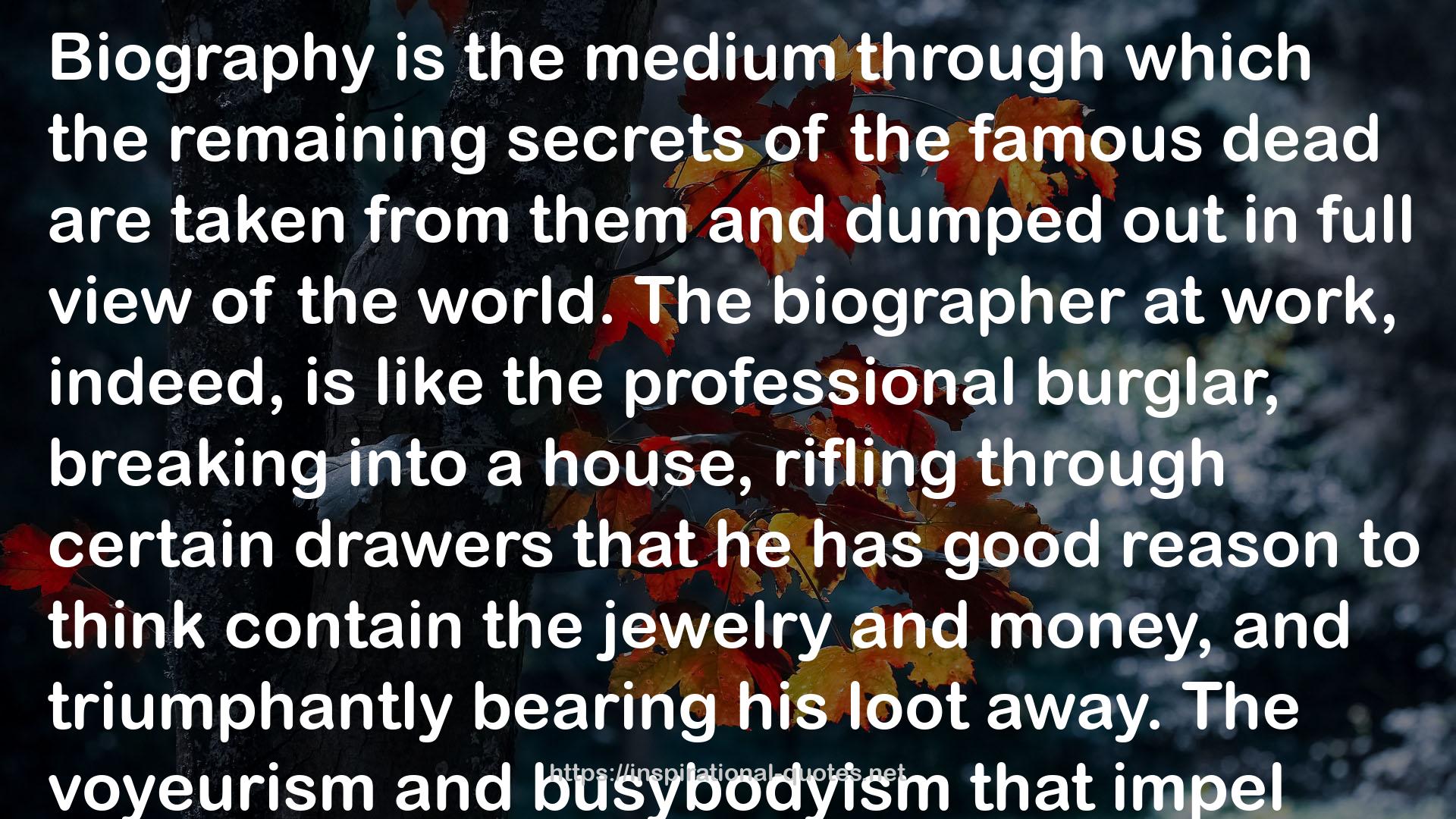1
" Biography is the medium through which the remaining secrets of the famous dead are taken from them and dumped out in full view of the world. The biographer at work, indeed, is like the professional burglar, breaking into a house, rifling through certain drawers that he has good reason to think contain the jewelry and money, and triumphantly bearing his loot away. The voyeurism and busybodyism that impel writers and readers of biography alike are obscured by an apparatus of scholarship designed to give the enterprise an appearance of banklike blandness and solidity. The biographer is portrayed almost as a kind of benefactor. He is seen as sacrificing years of his life to his task, tirelessly sitting in archives and libraries and patiently conducting interviews with witnesses. There is no length he will not go to, and the more his book reflects his industry the more the reader believes that he is having an elevating literary experience, rather than simply listening to backstairs gossip and reading other people’s mail. The transgressive nature of biography is rarely acknowledged, but it is the only explanation for biography’s status as a popular genre. The reader’s amazing tolerance (which he would extend to no novel written half as badly as most biographies) makes sense only when seen as a kind of collusion between him and the biographer in an excitingly forbidden undertaking: tiptoeing down the corridor together, to stand in front of the bedroom door and try to peep through the keyhole. "
― Janet Malcolm , The Silent Woman: Sylvia Plath and Ted Hughes
3
" Life, of course, never gets anyone's entire attention. Death always remains interesting, pulls us, draws us. As sleep is necessary to our physiology, so depression seems necessary to our psychic economy. In some secret way, Thanatos nourishes Eros as well as opposes it. The two principles work in covert concert; though in most of us Eros dominates, in none of us is Thanatos completely subdued. However-and this is the paradox of suicide-to take one's life is to behave in a more active, assertive, "erotic" way than to helplessly watch as one's life is taken away from one by inevitable mortality. Suicide thus engages with both the death-hating and the death-loving parts of us: on some level, perhaps, we may envy the suicide even as we pity him. It has frequently been asked whether the poetry of Plath would have so aroused the attention of the world if Plath had not killed herself. I would agree with those who say no. The death-ridden poems move us and electrify us because of our knowledge of what happened. Alvarez has observed that the late poems read as if they were written posthumously, but they do so only because a death actually took place. "When I am talking about the weather / I know what I am talking about," Kurt Schwitters writes in a Dada poem (which I have quoted in its entirety). When Plath is talking about the death wish, she knows what she is talking about. In 1966, Anne Sexton, who committed suicide eleven years after Plath, wrote a poem entitled "Wanting to Die," in which these startlingly informative lines appear: But suicides have a special language.
Like carpenters they want to know which tools.
They never ask why build.
When, in the opening of "Lady Lazarus," Plath triumphantly exclaims, "I have done it again," and, later in the poem, writes, Dying Is an art, like everything else.
I do it exceptionally well.
I do it so it feels like hell.
I do it so it feels real.
I guess you could say I've a call, we can only share her elation. We know we are in the presence of a master builder. "
― Janet Malcolm , The Silent Woman: Sylvia Plath and Ted Hughes
10
" I hope each of us owns the facts of her or his own life," Hughes wrote in a letter to the Independent in April, 1989, when he had been goaded by a particularly intrusive article. But, of course, as everyone knows who has ever heard a piece of gossip, we do not "own" the facts of our lives at all. This ownership passes out of our hands at birth, at the moment we are first observed.
The organs of publicity that have proliferated in our time are only an extension and a magnification of society's fundamental and incorrigible nosiness. Our business is everybody's business, should anybody wish to make it so. The concept of privacy is a sort of screen to hide the fact that almost none is possible in a social universe. In any struggle between the public's inviolable right to be diverted and an individual's wish to be left alone, the public almost always prevails. After we are dead, the pretense that we may somehow be protected against the world's careless malice is abandoned. The branch of the law that putatively protects our good name against libel and slander withdraws from us indifferently. The dead cannot be libelled or slandered. They are without legal recourse. "
― Janet Malcolm , The Silent Woman: Sylvia Plath and Ted Hughes

